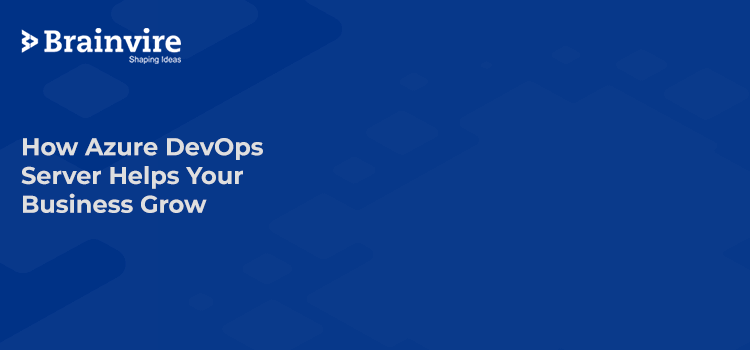
This is how Jamie Cool, Director of Program Management, Azure DevOps, defines the capabilities of Azure DevOps and Azure DevOps Server in a single statement. And being a Senior DevOps architect at a Microsoft-partnered company, I totally agree with him.
Understanding the core ideas behind these Microsoft innovations is crucial before we talk about their capabilities. This will help you adopt DevOps practices in a much more efficient way. So let’s get started with it.
What is Azure DevOps Server?
Azure DevOps server is the successor of the Team Foundation Server (TFS) and is used on-premises. It can be said that Azure DevOps Server is an advanced version of TFS. It helps teams in cross-functional software development and deployment.
Similarly, VSTS (Visual Studio Team Services) is now renamed as Azure DevOps Services. Basically, it’s the cloud version of Azure DevOps Server.
We will discuss the on-premise and cloud versions in separate sections. Each mode of deployment has some distinct advantages. But ultimately, both serve the same purpose: reduce developer workloads and roll out better software solutions.
Here’s what you get after choosing Azure DevOps server:
- Unrivaled levels of security
- Full control over update rollouts
- Bug tracking tool
Being a Microsoft Partnered Company, and working on a hybrid development model at multiple locations, we find TFS/ Azure DevOps Server utilization to be highly beneficial to avoid confusion and discrepancies.
I will elaborate on the above-mentioned aspects in a bit of detail.
Security
Azure DevOps Server helps users bring together their hardware, their processes, and their people. Its security, control, and expandability can easily adhere to any company’s security standards.
If your company’s security policy states that information has to be stored onsite, implementing Azure DevOps Server is a wise decision. You will get full control of how and where the company’s data can be accessed.
Authentication with Azure DevOps Server is done through your company’s Active Directory. This allows administrators to update permissions to Azure DevOps Server implementations in bulk using User Groups. In addition, administrators can add, move and remove users from an Active Directory Group.
Control Over Update Rollouts
Azure DevOps Server is well-equipped to manage update rollouts. If you wish to roll back or even prevent updates altogether, it’s possible. You can easily test and take a trial of new features and updates before releasing them to the client. As a business, your day-to-day operations will not be disrupted while the developers work on the new updates.
Bug Tracking Tool
The Azure DevOps server tracks bug fixes extremely well. It understands your development process and has a definitive flow. It serves as a knowledge base in which you can search for other bugs of a given type or see how many bugs were noted against a given module in an application. With the release of the July TFS Power Tools, it can also provide notifications.
Now, let’s explore Azure DevOps as a cloud solution.
Azure DevOps: The Cloud Approach
Microsoft Azure DevOps as a cloud solution offers the following benefits:
- You get freedom from hardware maintenance and infrastructure vulnerabilities.
- It’s a disaster-proof solution and comes with a 99% uptime SLA.
- The latest updates and new features are delivered to you every 3 weeks.
No-hardware implementation
Azure DevOps is a cloud-based solution that doesn’t require any locally maintained hardware. It reduces dependency on system admins for customization. All customization can be done through the application’s front-end interface.
Security
All DevOps instances are backed by Microsoft’s security policy commitments. It helps companies offering Microsoft Azure development services to keep your data fully secure.
Microsoft offers additional features to secure your projects. For example, Azure Active Directory enables bulk user management and Multi-Factor Authentication and IP restrictions. Admins can also set up restrictions on Microsoft Accounts at a project level.
Additional Azure DevOps benefits for Visual Studio Subscribers
As an active Visual Studio Subscriber, you get access to a range of features in Azure DevOps that are included with your subscription. You can use these features in each Azure DevOps organization in which you are a member, whether you created the organization or were added by someone else.
Sign in
After signing in to Azure DevOps using either the identity that you used for activating your Visual Studio subscription or your alternate identity, the system will recognize you automatically. Thus, you can also add a work or school account (which you use when logging into Visual Studio, Office 365, or your corporate or school network). This helps you gain access to Azure DevOps using both your personal account and work or school account.
Here’s a table depicting the eligibility of different subscription levels to various benefits.
How Morgan Lewis Pushed Digital Innovation Using a New DevOps Pipeline
Established in 1873, Morgan Lewis is a global law firm with a comprehensive portfolio of services, 30 offices, 2,200 legal professionals, and clients of all sizes in virtually every industry. Under pressure to increase efficiency, the innovative firm is using a DevOps pipeline based on Microsoft Visual Studio Team Foundation Server to speed application development. As a result, Morgan Lewis is accelerating the digital transformation of its law practices worldwide.
This is how the premier law firm’s Manager of Software Architecture and Development, Anthony Terra, reacted upon project completion:
How ALM Helps You Adopt DevOps Practices
An ALM (Application Lifecycle Management) platform with TFS is one of the best things you can think of when trying to adopt DevOps practices. It provides the backbone for delivering software continuously, fixes your deployments and also improves your testing lifecycle.
The entire lifecycle of your application passes through several stages before being deployed successfully. This is how the ‘release’ phase of ALM looks like:
Benefits of ALM in DevOps Implementation
INCREASE IN THE EFFICIENCY AND QUALITY
You can clearly define all the requirements and specifications of the project. The developer team can then ensure that the final product is designed as per the requirements without wasting extra resources.
INTEGRATED SOURCE CONTROL
Source control helps the development team keep track of every modification to the code. Developers can compare previous versions of the code with the current one and also fix errors if any mistake is made.
CLEAR VIEW OF THE WORKING PROCESS
The ALM tool provides effective tracking of work items along with check-in lists so that the development team has a clear view of their working processes. The managers can adjust the workloads for different employees.
Additional Tools from Azure DevOps to Complement Your Existing Workflows
Azure Pipelines
You can build, test and deploy with CI/CD. It works with any language, platform or cloud, including GitHub or any other Git provider.
Azure Test Plans
You can test and ship the solutions with confidence using manual and exploratory testing tools.
Azure Artifacts
In a single click, you can create, host and share packages with your team and add artifacts to your CI/CD pipelines.
Azure Repos
You get unlimited, cloud-hosted private Git repos and collaborate to build better code with pull requests and advanced file management.
Azure Boards
Start delivering value to your users faster. Use proven agile tools that enable planning, tracking and discussing work across your teams.
Extensions Marketplace
Access various extensions from Slack to SonarCloud along with 1000 other apps and services built by the Microsoft community.
Benefits of Azure DevOps
- Significant reduction in approval delays
- 50% Reduction in UAT (User Acceptance Testing) efforts
- 10-fold reduction in development rework
- 80% time saving on creating Trace Analysis
- 50% improvement in productivity
- 40% reduction in compliance reporting efforts
Things You Should Know About Azure DevOps
You don’t need Azure Subscription for Azure DevOps
Users often get confused if they need an Azure Subscription or not as Azure is a part of Azure DevOps. If you want to deploy your application on Azure, you should have an Azure subscription. But Azure DevOps’ functionality can be used without having an Azure subscription. In short, you don’t need an Azure subscription for managing your projects with full capability with Azure DevOps.
Pricing of Azure DevOps
Azure DevOps is free if you have a team size of up to 5. In case you have a small team, you can try its capabilities for free initially and pay for the advanced services as and when your team grows in size.
This is how smaller teams should use this benefit:
- Download and install Azure DevOps Server Express to your personal desktop or laptop without any dedicated server.
- Once your team grows beyond five members, upgrade to the full version of Azure DevOps Server.
- Subsequently, port all your history, files and workflows.
When using Self-Hosting in the Cloud, there will be no additional charges in Team Foundation Server for running builds. This is included in the server license of TFS 2017 and 2018. It also includes one free concurrent job.
Expanded Support for Azure SQL Database
This extended support allows enterprises to host their Azure SQL DevOps deployments in the Azure cloud, or in their own “earthed” data centers in Microsoft SQL Server.
New Management Interface
Users who upgrade from earlier versions of Team Foundation Server (TFS) can experience the new interface. It allows for start-to-finish analysis of deployments, so you can easily determine where deployments succeed and where they don’t.
Azure DevOps works with AWS or GCP
You will get the complete and best user experience of Azure DevOps if you are already using Azure.
Besides AWS or GCP, Azure DevOps works well even if you are using any other cloud for hosting services.
Summing it Up
If you are looking for Microsoft Enterprise Application Development services, Azure DevOps is your best choice. It provides you with all the excellent features and functionality in one single platform. If you have any other query or want to discuss a business idea, feel free to get in touch with Brainvire’s experts.
Related Articles
-
API-Driven Development in Next-Gen Web Applications
The foundation of Next-Gen Web Applications is API-Driven Development, which is transforming software development and integration. Application Programming Interfaces (APIs) are essential for developers to prioritize in order to build
-
Azure Cognitive Services – AI-powered Solutions
Introduction AI has become an integral part of our lives thanks to its rising prowess over the past few years. Today, Artificial Intelligence is easily found in almost every aspect
-
Cyber-Security Is Essential for Online Business
You never know what’s coming for you and your business, now, you have the time to increase the Cybersecurity and protect your business. Protect your ecommerce and customers, and their



